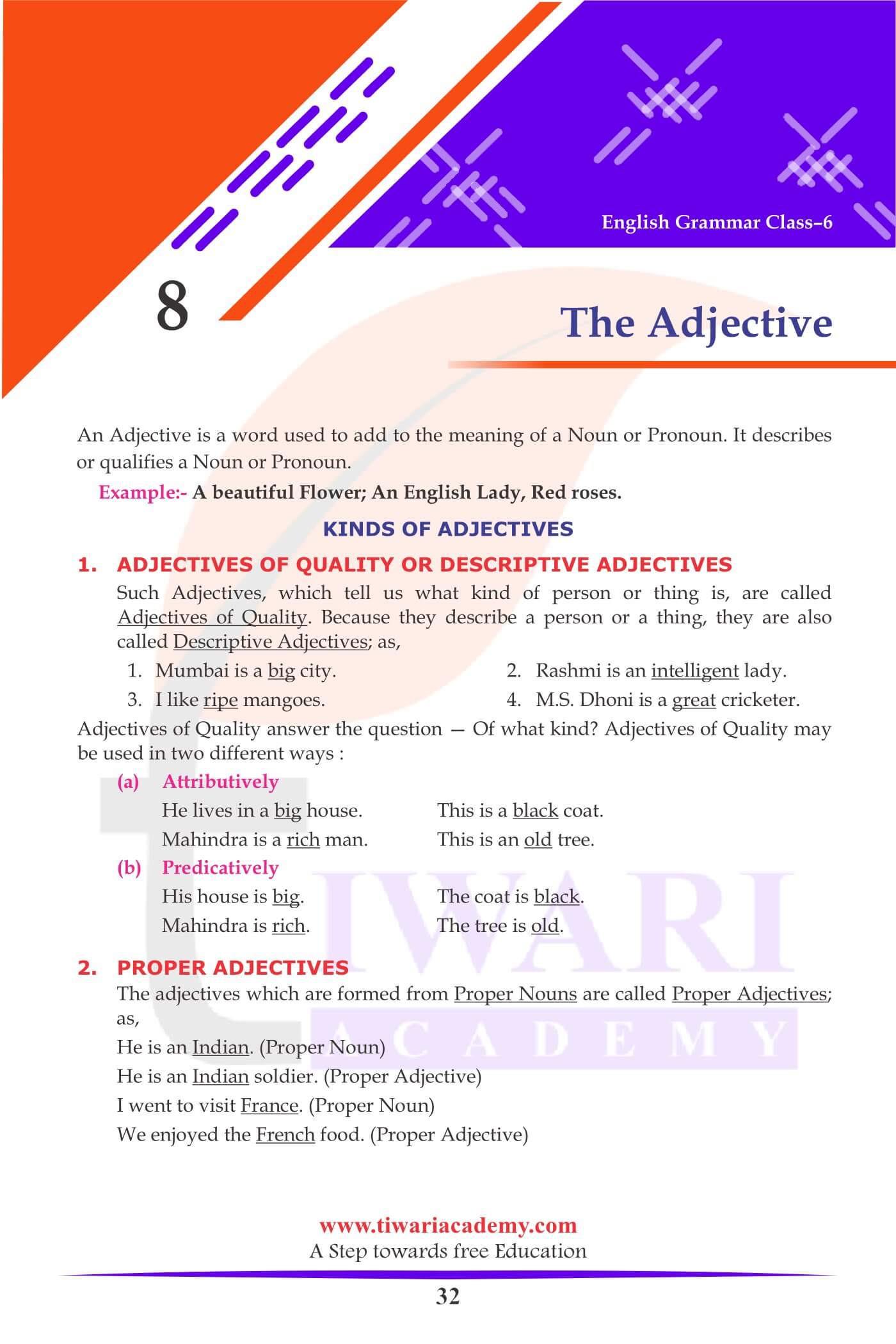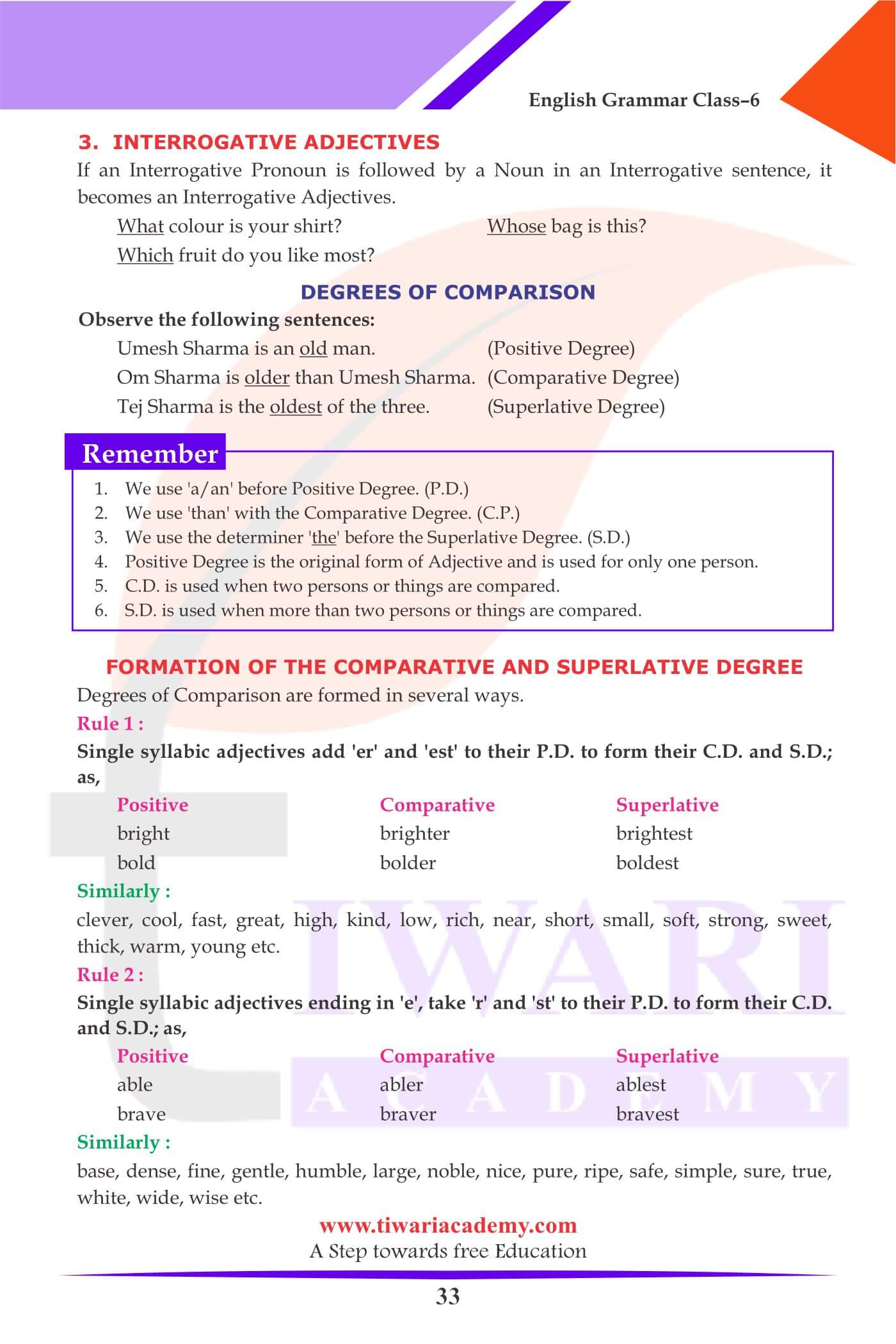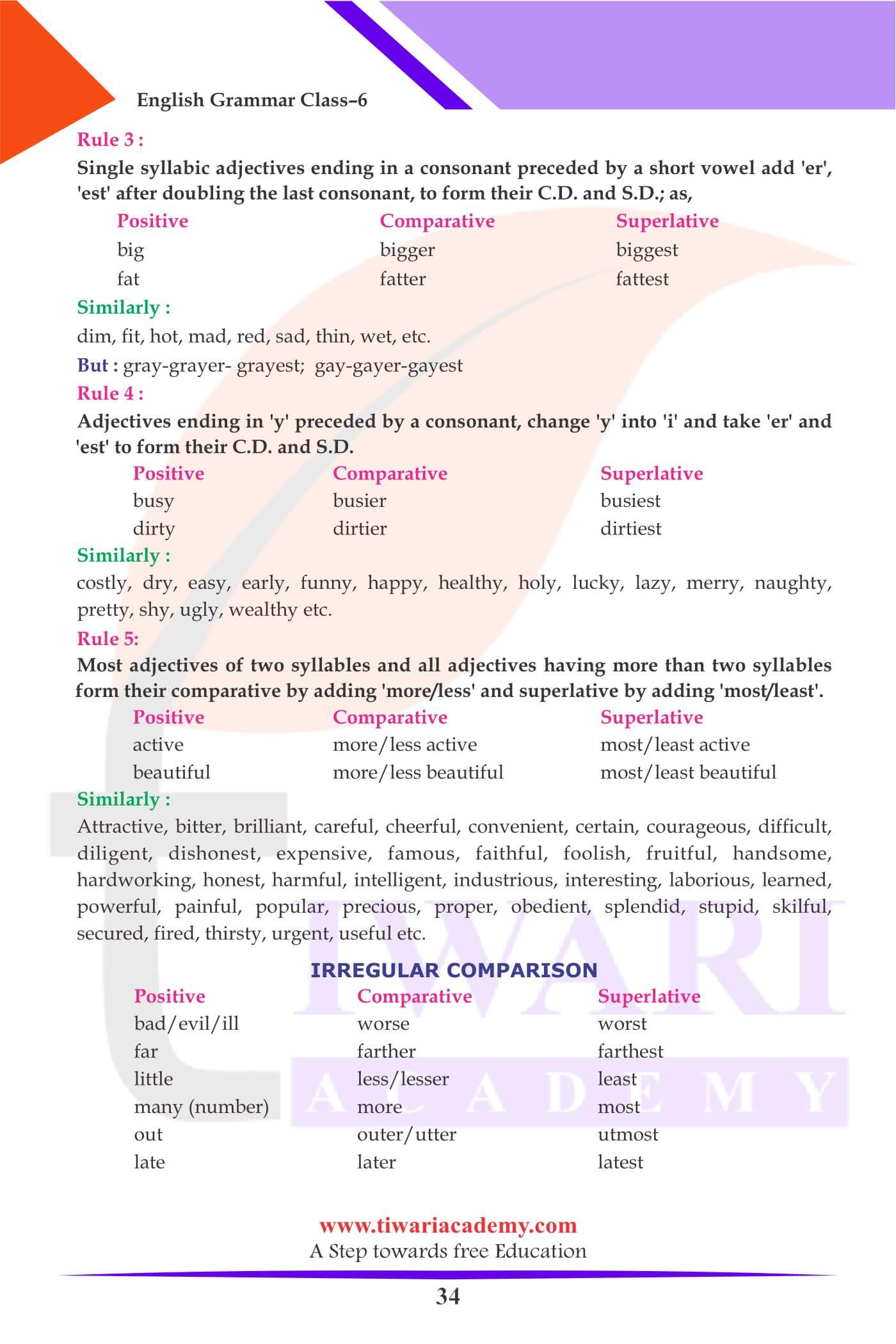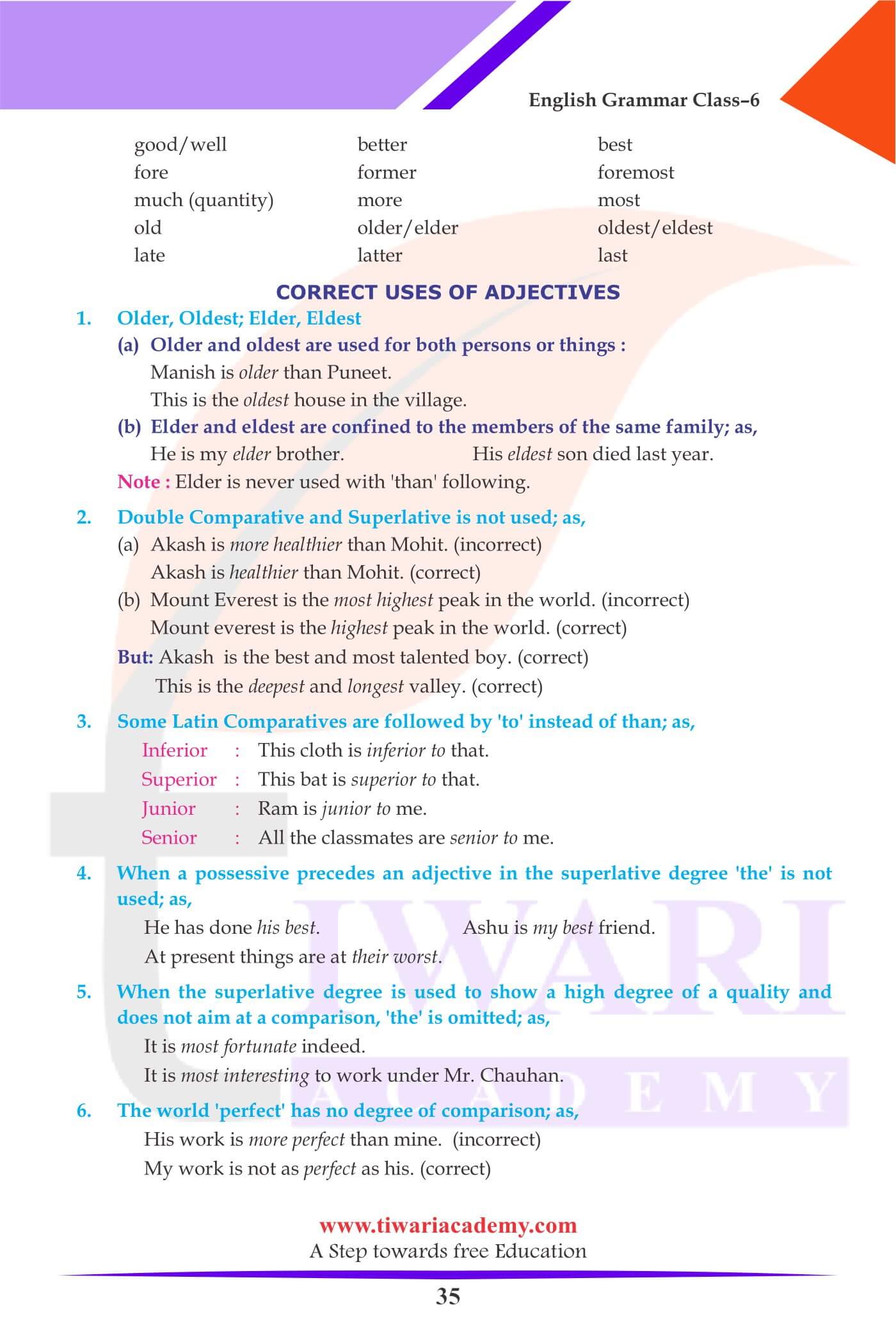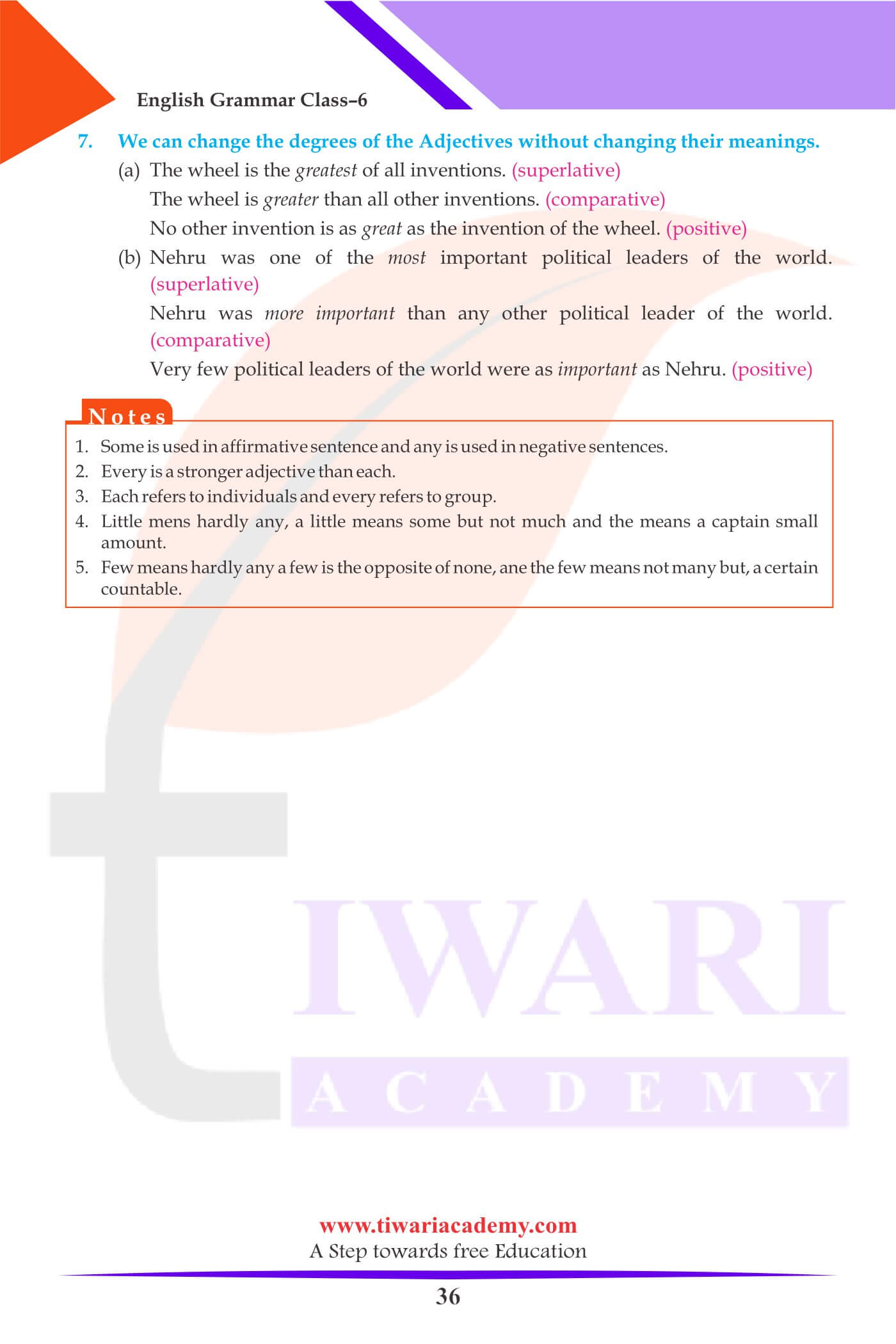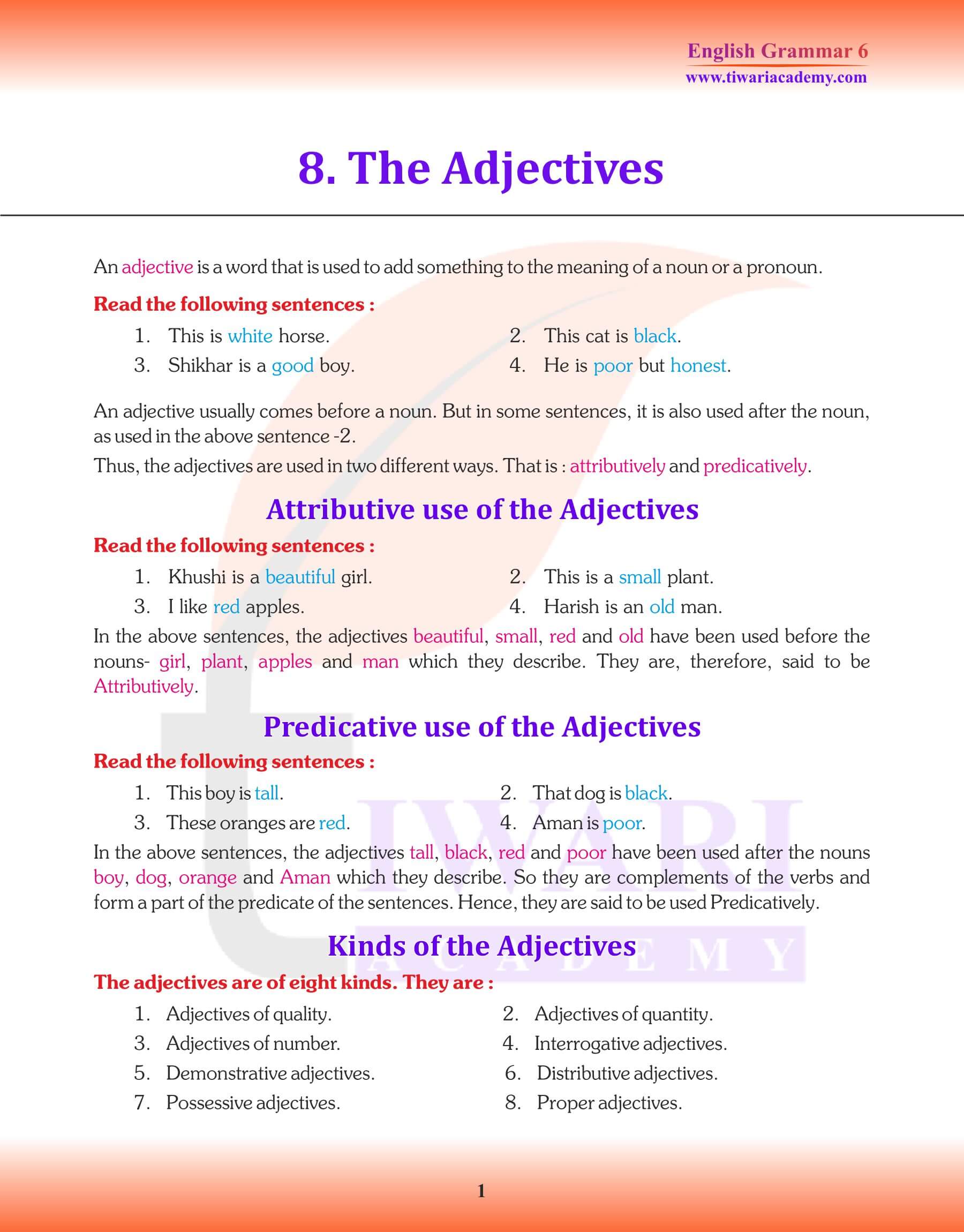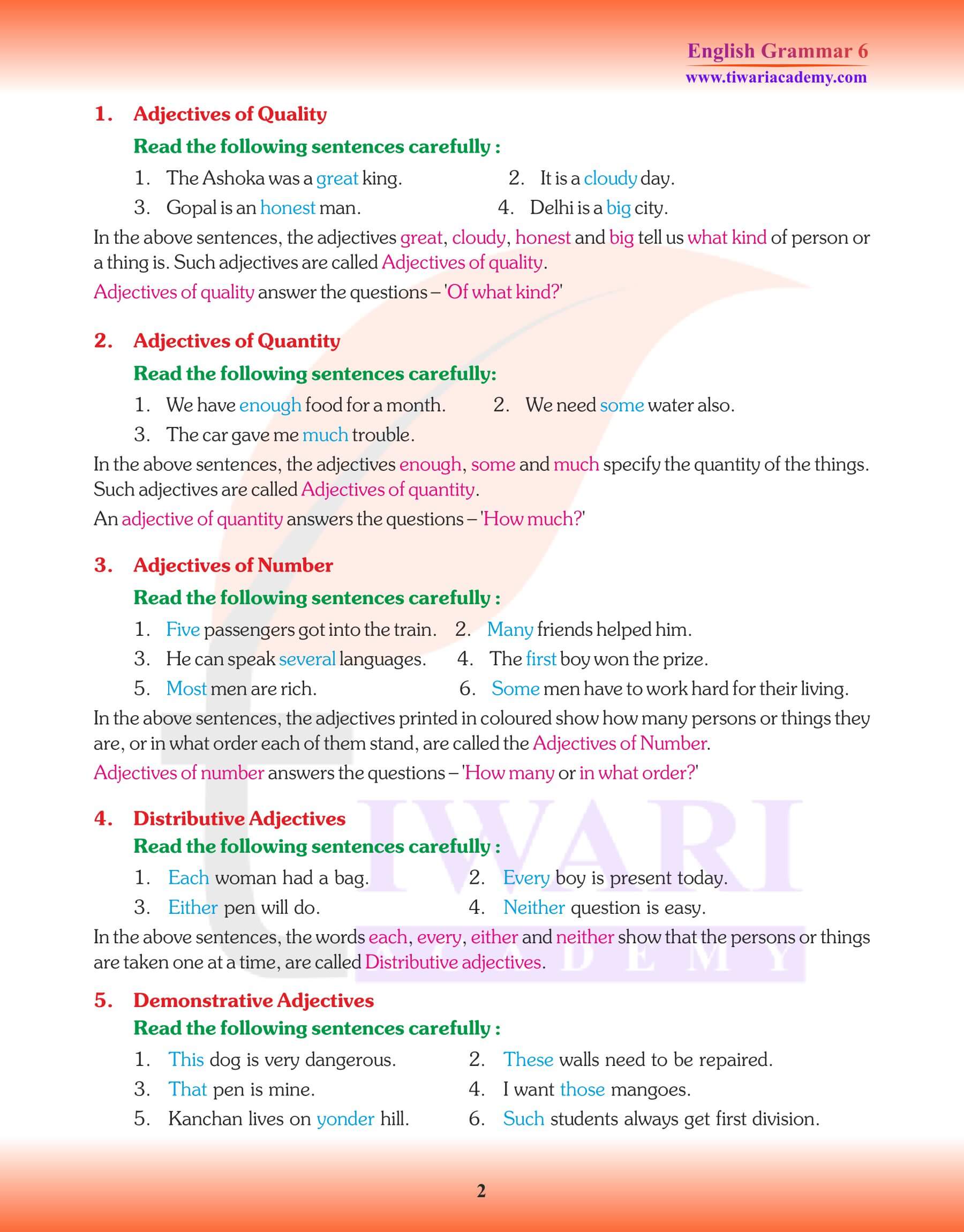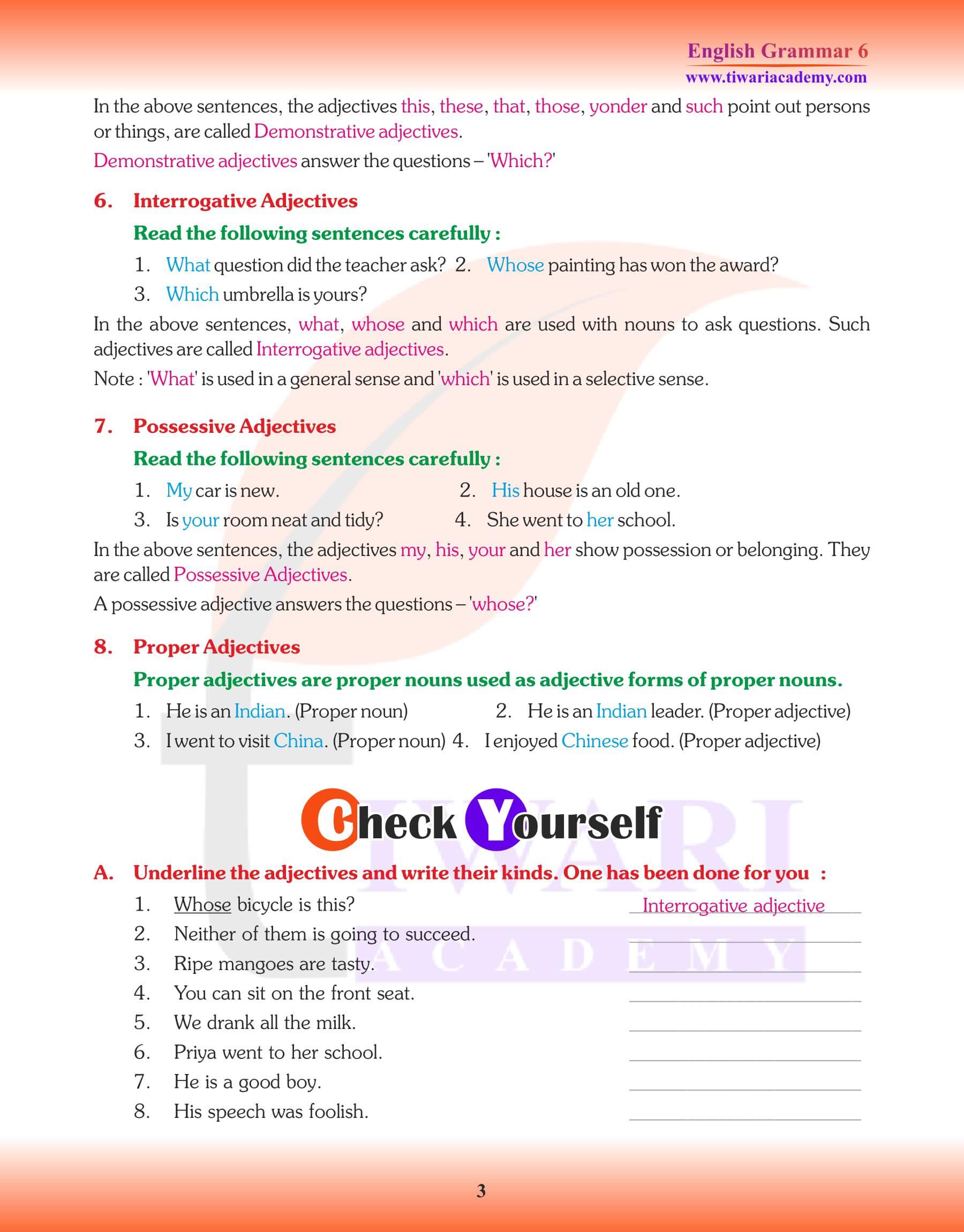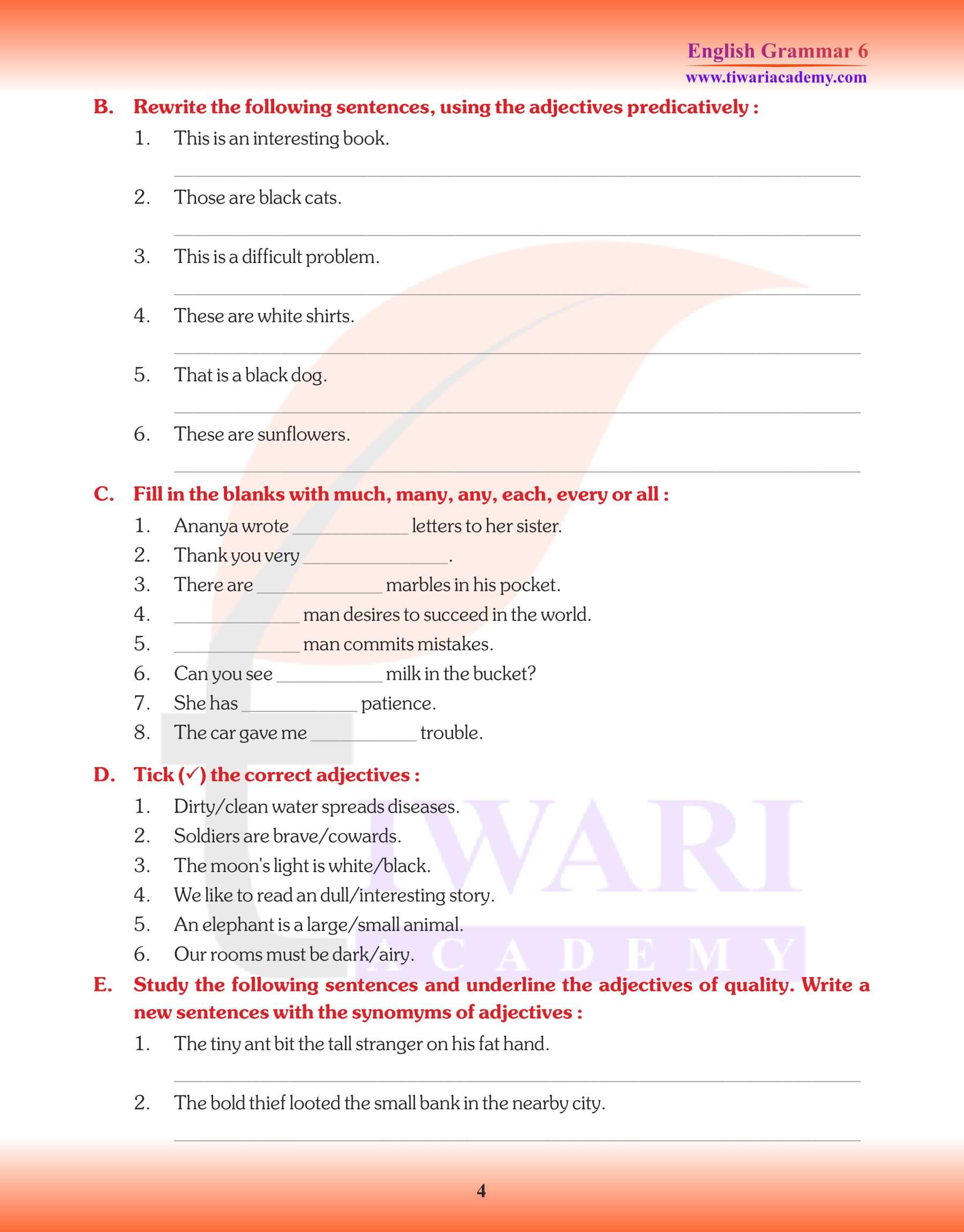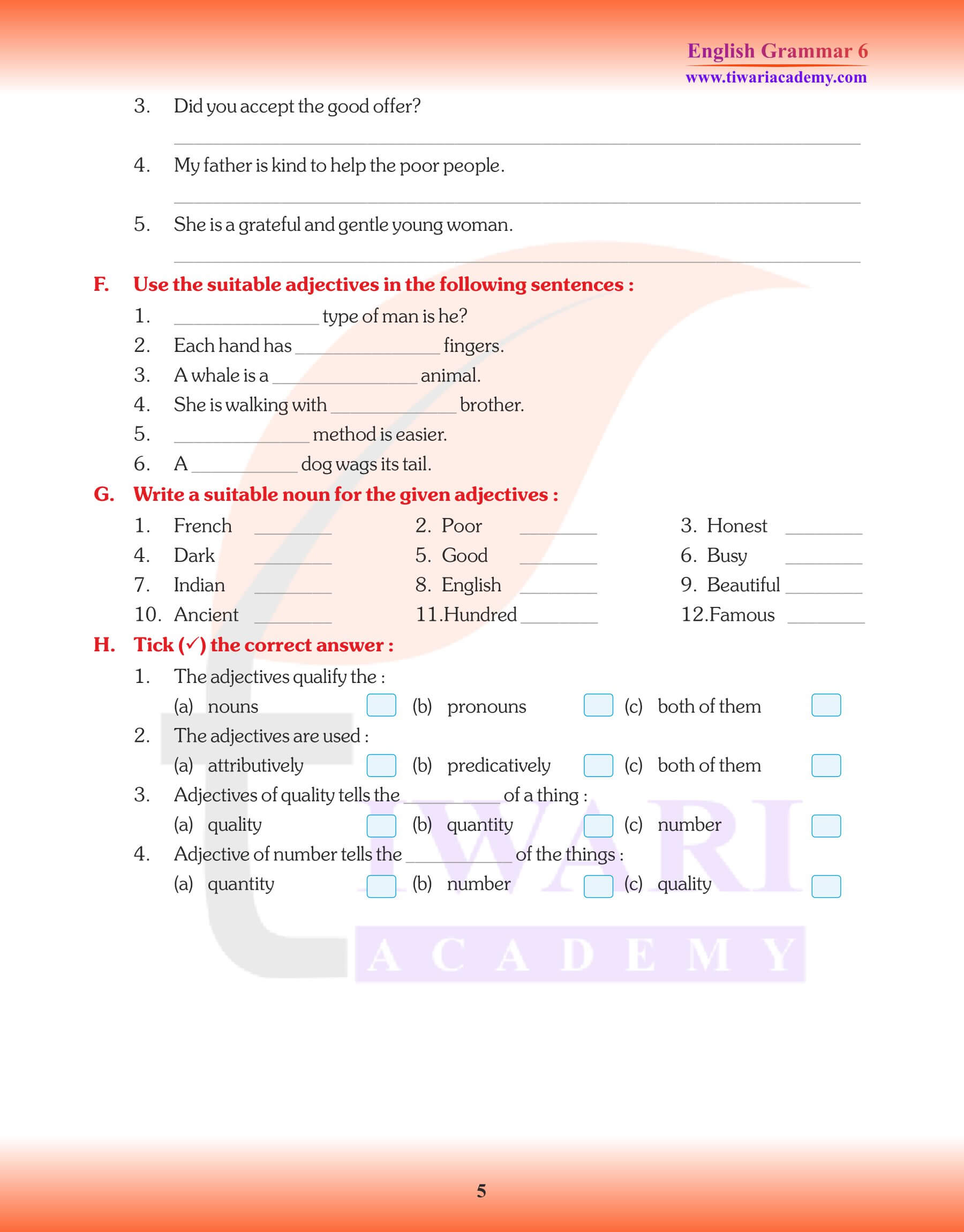An Adjective is a word used to add to the meaning of a Noun or Pronoun. In Class 6 English Grammar Chapter 8: The Adjective, we will know more about adjectives and its kinds. Adjective describes or qualifies a Noun or Pronoun. Such Adjectives, which tell us what kind of person or thing is, are called Adjectives of Quality. Because they describe a person or a thing, they are also called Descriptive Adjectives. The adjectives which are formed from Proper Nouns are called Proper Adjectives. If an Interrogative Pronoun is followed by a Noun in an Interrogative sentence, it becomes an Interrogative Adjectives. All the contents are in updated format for academic session 2024-25. UP Board, CBSE, Rajasthan, Hariyan, MP Board (Madhya Pradesh), Uttarakhand, etc., also can use these contents if they are using the new NCERT Textbooks as course books.
Adjective and its Uses with Explanation
| Class: 6 | English Grammar |
| Chapter: 8 | The Adjective |
| Content: | Textbook and Revision Notes |
| Academic Year: | 2024-25 |
Class 6 English Grammar Adjective and its Kinds
In Class 6 English Grammar Chapter 8, the detail study about the Adjectives are given for grade 6 students. Here we are discussing about the types of adjectives with illustrations and definitions.
Adjectives of Quality
Examples of Adjectives of Quality.
- Mumbai is a big city.
- Rashmi is an intelligent lady.
- Tiwari Academy is helping website.
- I like ripe mangoes.
- M.S. Dhoni is a great cricketer.
- He lives in a big house.
- Mahindra is rich.
- The tree is old.
- This is a black coat.
Proper Adjectives
Examples of Proper Adjectives.
- He is an Indian. (Proper Noun)
He is an Indian soldier. (Proper Adjective) - I went to visit France. (Proper Noun)
We enjoyed the French food. (Proper Adjective)
Interrogative Adjectives
Examples of Interrogative Adjectives.
- What colour is your shirt?
- Whose bag is this?
- Which fruit do you like most?
Degree of Comparison
Positive, Comparative and Superlative Degree.
- We use ‘a/an’ before Positive Degree.
- We use ‘than’ with the Comparative Degree.
- We use the determiner ‘the’ before the Superlative Degree.
- Positive Degree is the original form of Adjective and is used for only one person.
- Comparative Degree is used when two persons or things are compared.
- Superlative Degree is used when more than two persons or things are compared.
| Positive Degree | Comparative and Superlative Degree |
| bright | brighter – brightest |
| bold | bolder – boldest |
| able | abler – ablest |
| brave | braver – bravest |
Rules for Comparative and Superlative Degree
- Single syllabic adjectives add er and est to their Positive Degree to form their Comparative Degree and Superlative Degree.
- Single syllabic adjectives ending in e, take r and st to their Positive Degree to form their Comparative Degree and Superlative Degree.
- Single syllabic adjectives ending in a consonant preceded by a short vowel add er, est after doubling the last consonant, to form their Comparative Degree and Superlative Degree.
- Adjectives ending in y preceded by a consonant, change y into i and take er and est to form their Comparative Degree and Superlative Degree.
- Most adjectives of two syllables and all adjectives having more than two syllables form their comparative by adding more/less and superlative by adding most/least.
Correct Uses of Adjectives
Older, Oldest; Elder, Eldest
- Older and oldest are used for both persons or things.
Manish is older than Puneet.
This is the oldest house in the village. - Elder and eldest are confined to the members of the same family.
He is my elder brother.
His eldest son died last year.
Double Comparative and Superlative is not used
- Akash is more healthier than Mohit. (incorrect)
Akash is healthier than Mohit. (correct) - Mount Everest is the most highest peak in the world. (incorrect)
Mount everest is the highest peak in the world. (correct)
Some Latin Comparatives are followed by to instead of than
- Inferior: This cloth is inferior to that.
- Superior: This bat is superior to that.
- Junior: Ram is junior to me.
- Senior: All the classmates are senior to me.
Change the degrees of the Adjectives without changing their meanings
- The wheel is the greatest of all inventions. (superlative)
The wheel is greater than all other inventions. (comparative)
No other invention is as great as the invention of the wheel. (positive) - Nehru was one of the most important political leaders of the world. (superlative)
Nehru was more important than any other political leader of the world. (comparative)
Very few political leaders of the world were as important as Nehru. (positive)
Main Points for Class 6 English Grammar Chapter 8
- Some is used in affirmative sentence and any is used in negative sentences.
- Every is a stronger adjective than each.
- Each refers to individuals and every refers to group.
- Little mens hardly any, a little means some but not much and the means a captain small amount.
- Few means hardly any a few is the opposite of none, ane the few means not many but, a certain countable.
Feedback and Suggestions
Download NCERT Textbooks for class 6 and Offline Apps 2024-25 based on new CBSE Syllabus. Ask your doubts related to your educational board and share your knowledge with your friends and other users through Discussion Forum.
